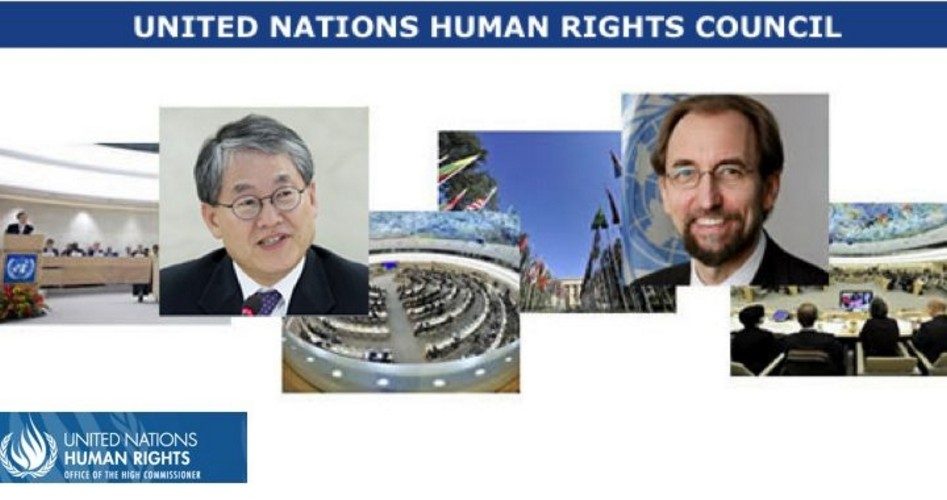
On May 17, 2016, on the 10th anniversary of its scandal-plagued existence, the dictator-dominated United Nations Human Rights Council was ridiculed at a U.S. congressional hearing that was seemingly meant to serve as a boost for the controversial outfit and everything it represents. One of the experts testifying at the event, for instance, compared the UN body to Frankenstein. The main takeaway, though, was that with some “reforms,” the dictators club and its “human rights” bureaucracy could do good work.
Even the roster of largely globalist voices selected by lawmakers to testify, however, could not conceal the absurdities inherent in the UN body — though many tried to do precisely that. And while one of the primary purposes of the hearing was to discuss how the U.S. government could “strengthen” the UN “human rights” outfit, the testimony inadvertently ended up outlining numerous excellent reasons for the outfit to be abolished altogether. In the meantime, the facts suggest the UN body should be mercilessly mocked by civilized people everywhere.
The hearing, entitled “Ten Years Later: The Status of the United Nations Human Rights Council,” aimed to examine the last decade of the outfit’s operations and the U.S. government’s involvement. According to the announcement, the hearing was supposed to examine “the successes and shortfalls of U.S. engagement with the U.N. Human Rights Council, its current forms of operation and priorities, and possible options for reform that would help the Council more effectively achieve its original mandate.”
A strong clue about its agenda could be gleaned from the name of the panel, the “Tom Lantos Human Rights Commission,” formerly known as the “Congressional Human Rights Caucus.” It was named after the late Congressman Tom Lantos, a California Democrat and fervent globalist with a cumulative score of 23 percent on The New American’s congressional scorecard known as the Freedom Index. The index calculates scores based on adherence to the U.S. Constitution, which all lawmakers swear to uphold. With less than one-fourth of his scored votes being constitutional, Lantos was hardly a defender of the individual rights guaranteed under the U.S. Constitution. Instead, he preferred the UN’s vision of pseudo-“human rights” — rights that can be revoked at will by government under virtually any pretext.
Still, the hearing provided a great deal of interesting insight. The first panel of witnesses was made up entirely of senior bureaucrats in the Obama administration involved in various elements of foreign policy and relations with the UN. Also testifying was Mark Lagon, a “senior fellow for human rights” at the global governance-promoting Council on Foreign Relations, who offered some mild criticism of specifics but a strong defense of globalism and globalist institutions generally. Even Republican Co-Chair Joseph Pitts claimed, “There can be no question of the need for stronger international action” to protect what the UN defines as “rights.” Like the two lawmakers who chaired the hearings, the people testifying largely emphasized the allegedly positive work of the UN body. Despite some mild criticism and calls for reforms, nobody testifying advocated a U.S. withdrawal from the dictators club.
A big focus of the hearing was whether the new UN “human rights” bureaucracy, launched a decade ago, was better than the old one. The reason the current iteration of the outfit is only 10 years old, though, remains just as relevant today. The UN “Human Rights Commission,” which existed for 60 years, had become such a discredited laughingstock that nobody could take it seriously. The theater of the absurd was so bad that the UN “Commission” even elected brutal Libyan dictator Moammar Gadhafi and his regime to lead it. Even then-UN boss Kofi Annan was forced to concede that the outfit had become a joke that “cast a shadow on the reputation of the United Nations system as a whole.” So they tried again with the “Council.”
Despite the apparent support for the overall UN and its agenda, perhaps the most noteworthy and interesting testimony came from Hillel Neuer, executive director of the Geneva-based watchdog group UN Watch. “Next month, Geneva will celebrate the 200th anniversary since Mary Shelley and her husband joined Lord Byron and others at Villa Diodati, in Geneva, right across from where the Council is today,” he said. “In that cold and gloomy June of 1816, amid the darkness, and storms of thunder and lightning, they exchanged ghost stories. Mary Shelley then had a nightmare, which she famously published: the story of an idealistic student who tried to create life, only to be horrified by its results, the story of Frankenstein.”
“I often walk past Villa Diodati,” Neuer continued in his remarks at the hearing. “When I gaze across Lake Geneva and see the UN Human Rights Council, I cannot help but wonder: If Eleanor Roosevelt and René Cassin [of the original UN Human Rights Commission] were alive, and beheld the sight of a body that grotesquely legitimizes murderers, dictators, and anti-Semites, would they not be revolted by what has become of their creation? Would they not conclude that today’s UN Human Rights Council has become Frankenstein’s monster, and their dream become a nightmare?”
It would appear to be so. Some of those testifying at the hearing, including Neuer, pointed out that the UN outfit does not even live up to its own mandates. For example, the UN Council was supposed to select only member governments that “uphold the highest standards in the promotion and protection of human rights.” Of course, there are very few governments in the world that actually meet that criteria, provided real rights are used as the yardstick rather than bogus UN-defined “human rights” that can be limited “by law” for almost any reason. More on that later. But for now, consider the council’s illustrious membership roster of human-rights defenders.
Among the rights-violating regimes serving on the “human rights” body are the communist and socialist autocracies oppressing Cuba, mainland China, Bolivia, Ecuador, El Salvador, Namibia, South Africa, Venezuela, and Vietnam. Plenty of Islamist dictatorships serve on the council, too, including, among others, those ruling Algeria, Qatar, Saudi Arabia, the United Arab Emirates, and more. Also on the outfit are the rulers of Russia, Macedonia, Kyrgyzstan, Ivory Coast, Congo, Burundi, and more. Just a handful of governments in what could be properly considered truly “free” countries serve on the Council.
The current situation is worse than it was under the disbanded commission, said Neuer. “Sadly, this year, in 2016, the Council membership has never been worse,” he explained. “A large majority of the Council members — 62 percent — fail to meet basic democracy standards as measured by Freedom House. Only 38% do meet those standards.” He cited another human-rights activist’s comments from a decade ago comparing the UN commission to a jury composed of, among others, “murderers and rapists” determined to “stymie investigation” of their crimes. “Sadly, ten years after the reform, these words apply even more today,” opined Neuer.
In his written testimony, the UN Watch chief noted that despite a handful of exceptions, the council had “systematically turned a blind eye to the world’s worst human rights violations.” No resolutions were passed for victims of the Communist Chinese dictatorship, for example, despite the regime’s “gross, systematic and state-wide repression, the unjust imprisonment of Nobel Laureate Liu Xiaobo and democracy leader Wang Binzhang, the massacre of Uighurs, and the killing of Tibetans.” No resolutions or outrage on forced abortions, organ harvesting from Falun Gong practitioners, persecution of Christians, or other atrocities, either.
The Stalinist regimes ruling Cuba and Zimbabwe also escaped criticism from the UN Council despite ongoing, widespread, and systematic atrocities perpetrated by those governments. Also avoiding scrutiny and condemnation were the Islamist regimes in Iran and Saudi Arabia, both of which continue to slaughter and torture civilians. In fact, no resolutions have even been proposed to condemn any of those repressive governments or their crimes.
While the world’s most brutal totalitarians praise each other for their commitment to UN-defined “human rights,” at least one government is constantly under fire. It’s not the one in North Korea, or the one in Cuba, or the genocidal maniac ruling Sudan, or the regime brutally oppressing more than a billion victims in mainland China. Instead, the target is a tiny, democratically elected government that is under constant and regular assault by the UN body. That government, of course, is the State of Israel. More than half of the resolutions criticizing governments that have been adopted since the UN “Human Rights Council” was created were condemnations of Israel. Even for vocal critics of the Israeli government and its policies toward Arabs, the numbers are impossible to justify.
And it gets even more bizarre. “What makes the resolutions on Israel different from virtually every other country-specific resolution is that they are suffused with political hyperbole, selective reporting, and the systematic suppression of any countervailing facts that might provide balance in background information or context,” added Neuer. “By contrast, even the Council’s resolutions on a perpetrator of atrocities such as Sudan — whose president, Omar al-Bashir, is wanted for genocide by the International Criminal Court — regularly included language praising, commending and urging international aid funds for its government.” The genocidal Bashir almost got to serve on the Council!
Also coming under fire from critics at the hearing was the UN’s “Universal Periodic Review” scheme. While often used to attack Western governments for everything from protecting actual individual rights to not having enough welfare programs, dictators use the process to shower each other with praise. In 2009, for example, the Libyan dictatorship praised Cuba for “promoting freedom of thought and expression,” Neuer pointed out. The communist regime in Beijing, meanwhile, used the opportunity to praise the Saudi dictatorship, which executes “apostates” and regularly beheads people, for its stellar record on “women’s rights.” A few years later, Beijing praised Saudi Arabia’s rulers for their “religious tolerance.” The Islamist regime returned the favor, praising China’s rulers for their programs on ethnic minorities. Seriously.
However, despite pointing out a broad range of problems and scandals that plague the UN outfit, Neuer offered a series of “recommendations” for the U.S. government to “reform” and improve the Council. Those include speaking out publicly against “the most egregious candidates,” and working to block their election to the UN council. He also called for Washington, D.C., to introduce resolutions against rights-abusing governments and to convene “special sessions” to deal with “gross abuses.” But none of that addresses the root of the problem, and it all assumes the UN was created with good intentions.
Despite all of the recommendations for “reforming” the UN Council offered by the watchdogs, globalists, and bureaucrats testifying at the hearing, the problems with the UN body are in reality systemic. To begin with, consider the UN’s “Universal Declaration of Human Rights.” While the document offers lip service to various liberties, it is based on several premises that make it fundamentally incompatible with unalienable, God-given rights as understood in the United States — individual rights that the American Declaration of Independence says government is instituted to protect.
Consider Article 29 of the declaration, for starters, which claims that “rights” can be limited “by law” under the guise of everything from “public order” to “the general welfare.” Separately, the same article claims that everyone has “duties to the community” and that “rights and freedoms” may “in no case be exercised contrary to the purposes and principles of the United Nations.” For perspective, that would be like the First Amendment saying Congress shall make no law abridging the freedom of speech, unless that speech is being used to criticize Congress or otherwise makes Congress unhappy. The declaration also assumes “rights” are bestowed by governments and treaties, whereas American traditions and jurisprudence are based on the idea that rights come from the Creator and governments exist merely to protect them.
The Tom Lantos Human Rights Commission, which held the hearings, has done some good work in the past. For instance, the congressional body helped expose the collaboration of U.S.-based technology giants with Communist China’s Orwellian censorship regime. It also shined a light on Beijing’s brutality against the people of Tibet in its genocidal effort to eliminate them and their culture from the planet.
However, the council has also served as an organ to advance dangerous establishment interests. Among other disgraceful episodes, the congressional body hosted the infamous “Kuwaiti woman,” the daughter of the Kuwaiti ambassador, who was deceptively presented to the American people as “Nurse Nayirah.” Her now-debunked lies about babies supposedly being removed from incubators by Iraqi forces and left to die on the floor helped George H.W. Bush justify launching his unconstitutional 1991 invasion of Iraq.
That war, Bush said in a nationally televised speech, was about building, in his words, a “New World Order,” in which a “credible United Nations can use its peacekeeping role [war-making forces] to fulfill the promise and vision of the UN’s founders.” Bush did not mention, of course, that the UN’s most important “founders” included, on the American side, Soviet spy Alger Hiss, the first secretary general of the UN who was convicted of perjury for lying about his espionage for Moscow. Bush also did not mention that the UN’s “peacekeeping” armies have for generations been raping and abusing the civilians they are ostensibly supposed to protect — especially in Africa, but all over the world too.
The congressional commission also appears to support the same agenda as Bush outlined in his infamous NWO speech. For instance, the caucus defines as its mission: “To promote, defend and advocate internationally recognized human rights norms in a nonpartisan manner, both within and outside of Congress, as enshrined in the Universal Declaration of Human Rights and other relevant human rights instruments.” As discussed previously, the UN’s vision of “human rights” is not compatible with American concepts of protected rights, such as those outlined in the U.S. Constitution’s Bill of Rights.
Rather than focus on “reforming” the UN outfit and promoting UN-defined “human rights,” Congress should focus on severing America’s ties with the despot-dominated and totally discredited global organization. A bill currently in Congress would do precisely that. There is no good reason why Americans should be forced to fund and legitimize a group of autocracies as they seek to redefine the concept of rights around the world. Instead, U.S. lawmakers should show a renewed commitment to the unalienable rights guaranteed in the U.S. Constitution, and to protecting those rights from all enemies, foreign and domestic.
Alex Newman, a foreign correspondent for The New American, is normally based in Europe. Follow him on Twitter @ALEXNEWMAN_JOU. He can be reached at [email protected]
Related articles:
United Nations Exploits Pseudo-“Human Rights” to Attack U.S.
Ruthless Tyrants Win Seats on UN “Human Rights” Council
UN “Human Rights” Report Attacks U.S. Gun Rights, Constitution
UN: Gov’t Must Control Private Schools Because of “Human Rights”
UN Feminists Slam U.S. on “Gender,” Push Amending Constitution
UN Boss: U.S. Gay Marriage Ruling a “Great Step for Human Rights”
UN Seeks to Criminalize Free Speech, Citing “Human Rights”
UN Demands Obama “Nullify” Stand Your Ground Laws
UN Ridiculed for Attacking Poverty and Demanding Tax Hikes in Canada
UN Human Rights Attack on U.K. Ridiculed as “Marxist Diatribe”
UN Attacks U.S. Gun Rights and More, Citing Ferguson and Cops
Sudan’s Mass-murdering Tyrant May Join UN “Human Rights” Council
The United Nations: On the Brink of Becoming a World Government
Congressman Mike Rogers Introduces Bill to Get U.S. Out of UN



